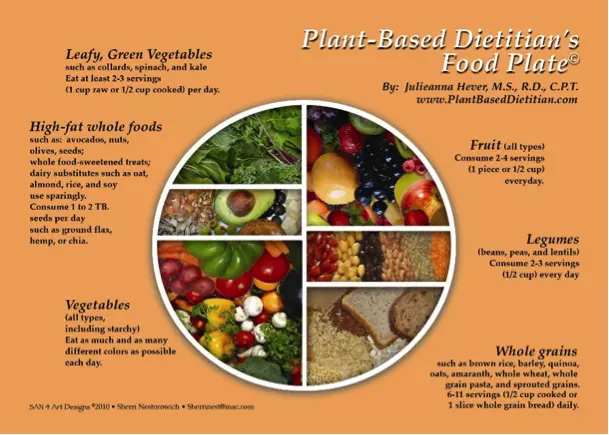Veganism is a plant-based lifestyle practiced by millions of people around the world, and it takes many forms. Nowadays, more and more people are turning towards veganism for various reasons. Have you ever considered becoming vegan, or maybe already do, then the question "What are the 4 types of vegans?" may come to mind. Unfortunately, veganism is not a one-size-fits all solution; individuals may take different approaches. As a vegan expert and blogger, I believe everyone should understand the four types of veganism and what sets them apart. In this post, we'll explore these various forms of veganism including dietary, ethical, environmental, and health veganism. Here, we'll investigate each type of veganism and its implications - both advantages and challenges included. Whether you are already an expert or just curious to learn more, keep reading to explore the many types of vegans out there and gain insight on how you can incorporate a plant-based lifestyle that works for you.
I. Dietary Vegans
Dietary veganism, also referred to as 'veganism,' is the most widespread type of veganism. This involves abstaining from animal-based products or by-products in one's daily diet - such as meats, fish, poultry, dairy products, eggs, honey and gelatin found in certain confectioneries. Instead they consume plant-based meals such as fruits, vegetables grains legumes nuts seeds etc.
People choose dietary veganism for various reasons. Some do so to reduce their environmental footprint or energy consumption, while others make the switch towards a healthier lifestyle. Studies have demonstrated that those on dietary vegan diets experience lower rates of heart-related diseases, diabetes and high blood pressure than non-vegans. Furthermore, plant-based meals tend to be nutrient dense and fiber rich which leads to better digestion, healthier gut flora and stronger immunity functions.
Dietary vegans typically adhere to certain lifestyle practices. For instance, they read food labels carefully before buying or consuming groceries to guarantee there are no animal-based ingredients present. Furthermore, many dietary vegans avoid restaurants or fast-food chains in favor of home-cooked meals.
Adopting a vegan lifestyle can present some challenges, particularly when attending social functions or events. To ensure the smooth running of their event, dietary vegans are advised to communicate their dietary restrictions with their hosts ahead of time or bring snacks and vegan meals along for comfort.
It is essential to remember that any plant-based diet, vegan or not, has its advantages and potential drawbacks. Therefore, consulting with a nutritionist or dietician for guidance on a balanced vegan diet is highly recommended.
II. Ethical Veganism
Ethical vegans embrace veganism as a lifestyle and philosophy that upholds animals as other beings deserving dignity and respect. They don't consume animal-based products or by-products, nor do they use products tested on animals nor purchase clothing made from sources derived from animals.
Ethical vegans believe that veganism is not simply a diet; it is an imperative moral and ethical stand that animals should never be used for human exploitation, entertainment or experimentation. Animal welfare is at the forefront of ethical veganism and all decisions they make take into account animals' rights.
Ethical vegans apply their moral and ethical convictions to all aspects of life, leading them to more specific lifestyle practices. For instance, they may opt for buying only from businesses that follow cruelty-free standards, avoid animal-based entertainment like circuses or zoos, and even avoid wearing leather, silk, or wool clothing since their production involves animal exploitation.
It is essential to recognize that ethical veganism stems from a place of compassion for animal life and the earth's ecosystem. Those who practice ethical veganism believe all beings have value and should not be subjected to harm.

Although ethical veganism has its advantages, one major drawback is the indignity of feeling different from others. Few social events cater specifically to vegan food or lifestyle, making it difficult to join in on activities or festivities that are common to other cultures.
III. Environmental Vegans
Environmental veganism is founded on the idea that individual lifestyle and dietary choices have an effect on planet Earth's health. Environmental vegans believe that veganism helps preserve natural resources, encourages sustainable farming practices, and reduces greenhouse gas emissions.
One of the primary motivations people turn towards veganism is to reduce their environmental footprint. Mass production of meat, poultry and fish has been found not only to be cruel to the animals involved but also detrimental to the environment - many products come from animal agriculture which contributes significantly to greenhouse gas emissions, water pollution and deforestation. Furthermore, adopting a plant-based diet requires less land, energy and water compared to producing meat or dairy products.
Environmental vegans not only follow a plant-based diet, but they also strive to reduce their waste and carbon footprint. This often entails using energy efficient cars, recycling waste materials, and selecting eco-friendly products.
Adopting an environmental vegan lifestyle has its risks and rewards. Not only does it reduce one's impact on the environment, but it could also result in improved physical wellbeing. Plant-based diets tend to be nutrient dense and fiber dense which has been known to improve gut health and reduce chronic disease risks.
Environmental veganism offers many advantages, but also presents its challenges. The primary issue is a lack of infrastructure and resources to support an eco-friendly lifestyle. For instance, vegan food options in grocery stores tend to be limited, making plant-based eating difficult in certain regions.
IV. Health Vegans
Health veganism is a relatively recent subculture within veganism that emphasizes the physical benefits of following a plant-based diet. Health vegans do so to reduce their risk for chronic illnesses like heart disease, cancer, and diabetes.
Research into the health effects of adopting a plant-based diet has been widely debated and studied. Some studies suggest that eating more natural, unprocessed foods like fruits, vegetables, nuts, and legumes is linked to lower rates of obesity, high blood pressure, high cholesterol, and type 2 diabetes.
Health vegans typically follow a whole-food, plant-based diet, which eliminates all processed foods, oils, and refined sugars. Instead of following religious or philosophical convictions, veganism becomes more of an attitude than just a way of life.
Adopting a health vegan lifestyle typically involves more conscious food decisions such as reading labels carefully, planning meals ahead of time, and using supplements for nutrition. It may also require further education on holistic wellness or engaging in regular exercise to support nutritional outcomes.

Health veganism offers several advantages for individuals, but it can be challenging to follow a strictly plant-based diet due to the abundance of processed and unhealthy vegan fast food options. Furthermore, switching to an inadequate dietary plan may lead to overeating and the loss of essential nutrients - so caution is advised when making such lifestyle modifications.
Conclusion:
Now that we've explored four distinct types of vegans - dietary, ethical, environmental and health - it is evident that veganism takes on many forms with distinct motivations, values and lifestyles. Whether you choose veganism for animal welfare, environmental reasons or health benefits - or any combination thereof - there are numerous ways to embrace the plant-based lifestyle; ultimately the type of veganism you select depends on your core beliefs, personal health goals and ethical values.
The advantages of veganism are numerous and well-documented, such as reduced greenhouse gas emissions, improved physical health, enhanced animal welfare and global food security. But it's essential to accurately identify which form of veganism best suits your needs and values.
Finally, adopting veganism, no matter its form, is a powerful and conscientious step you can take for sustainability, animal welfare, and personal health. We hope this guide has provided you with valuable insight into the four types of vegans so that you can better decide which path aligns with your values and lifestyle.




